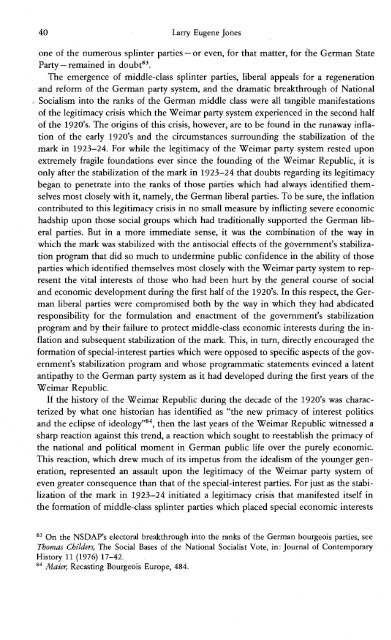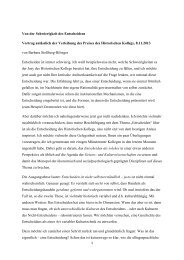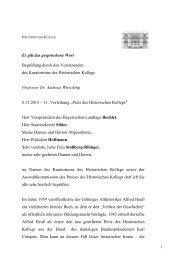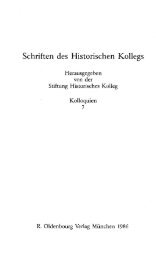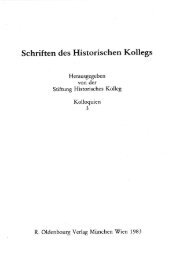Schriften des Historischen Kollegs - Kolloquien 6 - Historisches Kolleg
Schriften des Historischen Kollegs - Kolloquien 6 - Historisches Kolleg
Schriften des Historischen Kollegs - Kolloquien 6 - Historisches Kolleg
Erfolgreiche ePaper selbst erstellen
Machen Sie aus Ihren PDF Publikationen ein blätterbares Flipbook mit unserer einzigartigen Google optimierten e-Paper Software.
40 Larry Eugene JOIles<br />
one of the numerous splinter parties - or even, for that matter, for ihe German State<br />
Party - remained in doubt 83 .<br />
The emergence of middle-dass splinter parties, liberal appeals for aregeneration<br />
and reform of the German party system, and the dramatic breakthrough of National<br />
, Socialism into the ranks of the German middle dass were all tangible manifestations<br />
of the legitimacy crisis which the Weimar party system experienced in the second half<br />
of the 1920's. The origins of this crisis, however, are to be found in the runaway inflation<br />
of the early 1920's and the circumstances surrounding the stabilization of the<br />
mark in 1923-24. For while the legitimacy of the Weimar party system rested upon<br />
extremely fragile foundations ever since the founding of the Weimar Republic, it is<br />
only after the stabilization of the mark in 1923-24 that doubts regarding its legitimacy<br />
began to penetrate into the ranks of those parties which had always identified themselves<br />
most dosely with it, namely, the German liberal parties. To be sure, the inflation<br />
contributed to this legitimacy crisis in no small measure by inflicting severe economic<br />
hadship upon those social groups which had traditionally supported the German liberal<br />
parties. But in a more immediate sense, it was the combination of the way in<br />
which the mark was stabilized with the antisocial effects of the government's stabilization<br />
program that did so much to undermine public confidence in the ability of those<br />
parties which identified themselves most dosely with the Weimar party system to represent<br />
the vital interests of those who had been hurt by the general course of social<br />
and economic development during the first half of the 1920's. In this respect, the German<br />
liberal parties were compromised both by the way in which they had abdicated<br />
responsibility for the formulation and enactment of the government's stabiliiation<br />
program and by their failure to protect middle-dass economic interests during the inflation<br />
and subsequent stabilization of the mark. This, in turn, directly encouraged the<br />
formation of special-interest parties which were opposed to specific aspects of the government's<br />
stabilization program and whose programmatic statements evinced a latent<br />
antipathy to the German party system as it had developed during the first years of the<br />
Weimar Republic.<br />
If the history of the Weimar Republic during the decade of the 1920's was characterized<br />
by what one historian has identified as "the new primacy of interest politics<br />
and the edipse of ideology"84, then the last years of the Weimar Republic witnessed a<br />
sharp re action against this trend, areaction which sought to reestablish the primacy of<br />
the national and political moment in German public life over the purely economic.<br />
This reaction, which drew much of its impetus from the idealism of the younger generation,<br />
represented an assault upon the legitimacy of the Weimar party system of<br />
even greater consequence than that of the special-interest parties. For just as the stabilization<br />
of the mark in 1923-24 initiated a legitimacy crisis that manifested itself in<br />
the formation of middle-dass splinter parties which placed special economic interests<br />
83 On the NSDAP's electoral breakthrough into the ranks of the German bourgeois parties, see<br />
Thomas Childers, The Social Bases of the National Socialist Vote, in: Journal of Contemporary<br />
History 11 (1976) 17-'42.<br />
84 Maier, Recasting Bourgeois Europe, 484.


